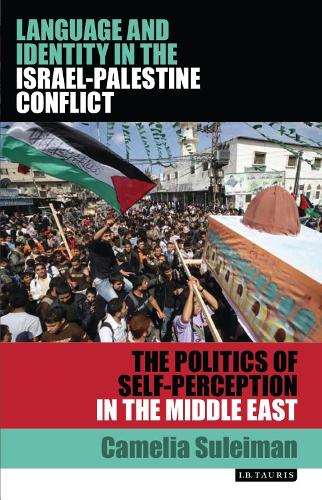
Language and Identity in the Israel-Palestine Conflict: The Politics of Self-Perception in the Middle East
(Hardback)
Publishing Details
Language and Identity in the Israel-Palestine Conflict: The Politics of Self-Perception in the Middle East
By (Author) Camelia Suleiman
Bloomsbury Publishing PLC
I.B. Tauris
30th September 2011
United Kingdom
Classifications
Tertiary Education
Non Fiction
327.5694
Physical Properties
Hardback
248
Width 138mm, Height 216mm
452g
Description
The conflict between Israel and Palestine is, and remains to be, one of the most widely- and passionately-debated issues in the Middle East and in the field of international politics. An important part of this conflict is the dimension of self-perception of both Israelis and Palestinians caught up in its midst. Here, Camelia Suleiman, using her background in linguistic analysis, examines the interplay of language and identity, feminism and nationalism, and how the concepts of spatial and temporal boundaries affect self-perception. She does this through interviews with peace activists from a variety of backgrounds: Palestinians with Israeli citizenship, Jewish Israelis, as well as Palestinians from Ramallah, officially holders of Jordanian passports. By emphasizing the importance of these levels of official identity, Suleiman explores how self-perception is influenced, negotiated and manifested, and how place of birth and residence play a major role in this conflict. This book therefore holds vital first-hand analysis of the conflict and its impact upon both Israelis and Palestinians, making it crucial for anyone involved in Middle East Studies, Conflict Studies and International Relations.
Reviews
'This book's merits are expressed in the author's command of her field - sociolinguistics - and in her innovative insights on the Palestinian-Israeli conflict. On the most general level, Suleiman adds a hitherto neglected aspect in the study of the conflict: the views and roles of peace activists on both sides. This addition is a welcome acknowledgement of the complex nature of the conflict and of its major players, as represented by her interviewees and by her own introspection. Furthermore, Suleiman's lively and easily readable style features an unusual combination of personal witnessing with a humanist approach, and a meticulous academic method. This allows for a better understanding of her analysis - and her particular position as an outsider in both the Israeli and Palestinian worlds, as she vividly describes in various parts of the book - so as to enable a wide readership, ranging from the experts to the 'uninitiated', and including teachers and students, to agree or disagree, praise or debate her arguments.' - Dov Shinar, Dean, Professor and Head of Fair Media: Center for the Study of Conflict, War and Peace Coverage, School of Communication, Netanya Academic College, Israel; 'This book is important for its subject matter and innovative in terms of what the author brings to the equation: the artful application of linguistic and discourse analytic tools to allow a deeper understanding of the dynamics of communication in contexts that are ultimately life or death; and a cross-cultural personal experience which is incorporated into her analysis in the nuanced and reflexive manner of anthropologists. Camelia Suleiman's sociolinguistic background has helped her carve out an area for research that has relevance not only to the field of linguistics, but to issues pertinent to conflict resolution.' - Colleen Cotter, Senior Lecturer, Linguistics Department, Queen Mary, University of London
Author Bio
Camelia Suleiman is Visiting Assistant Professor of Arabic, Bryn Mawr College, Pennsylvania. She has taught a wide range of courses in Arabic Language and Middle East History and Culture. Educated at the University of Haifa, she also holds a PhD from the Department of Linguistics at Georgetown University.
